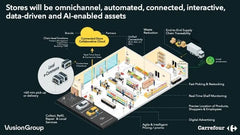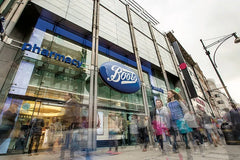
Retail Innovations and Challenges: A Weekly Roundup of Major Developments
Table of Contents
- Key Highlights:
- Introduction
- The Asos Controversy: Customer Accounts and High Returns
- Veloq: AI-Driven Grocery Fulfillment
- Diebold Nixdorf and AI-Powered Self-Service Checkouts
- Debenhams and InPost: Enhancing Delivery Options
- Sainsbury's Tech Con 2025: Future of Grocery Retail
- Just Eat and the Launch of JET Go
- The Role of Technology in Modern Retail
- The Importance of Customer Loyalty and Retention
- Conclusion
- FAQ
Key Highlights:
- Asos faces backlash as customer accounts are closed due to high return rates, raising questions about loyalty and fairness in retail.
- Edward Salmon takes the helm as Director of Veloq, aiming to revolutionize grocery fulfillment with AI technology.
- Diebold Nixdorf enhances the EDEKA Beckesepp store experience with AI-powered self-service checkouts for better customer engagement.
Introduction
The retail industry is undergoing a seismic shift driven by technology, consumer behavior changes, and evolving market dynamics. This week has seen significant developments across various sectors, from fast fashion to grocery chains, reflecting both innovation and challenges faced by retailers. As brands like Asos grapple with customer dissatisfaction over account closures, others, such as Veloq and Diebold Nixdorf, are pushing the envelope in technology and fulfillment solutions. This article delves into the latest happenings from notable companies including Debenhams, Sainsbury's, and Just Eat, highlighting how these changes impact consumers and the broader retail landscape.
The Asos Controversy: Customer Accounts and High Returns
In an unexpected move, Asos has begun closing customer accounts due to what it deems excessive return activity. The company's updated fair use policy has sparked outrage among loyal customers, who feel betrayed by a brand they have supported for years. One such customer, Rhea Sangha, took to LinkedIn to express her dismay, illustrating a growing sentiment among consumers who believe that the nature of online shopping inherently involves returns.
The backlash highlights a critical issue in the fast fashion industry: balancing profitability with customer satisfaction. Online retailers often grapple with high return rates, which can significantly affect their bottom line. However, as Sangha pointed out, the essence of online shopping is the inability to physically assess products prior to purchase. Asos's approach may deter some customers from shopping altogether, raising questions about how retailers define fair use and the implications of penalizing loyal customers.
Veloq: AI-Driven Grocery Fulfillment
On the technological front, Veloq has entered the retail scene with a focus on grocery fulfillment through artificial intelligence. Recently appointed Director Edward Salmon brings over twelve years of experience in scaling startups and transforming multinational corporations. Veloq's platform integrates advanced technologies, including automated picking and intelligent routing, aimed at streamlining the fulfillment process.
This approach is critical in today's competitive grocery market, where efficiency and customer satisfaction are paramount. Veloq’s modular platform allows grocers to adapt to changing consumer demands while optimizing their supply chain management. The potential for AI to enhance the grocery shopping experience cannot be understated, as it holds the promise of delivering personalized services and reducing operational costs.
Diebold Nixdorf and AI-Powered Self-Service Checkouts
In a move that emphasizes the blend of technology and customer convenience, Diebold Nixdorf has equipped EDEKA Beckesepp in Germany with advanced self-service checkouts. These checkouts utilize Smart Vision technology, enabling customers to scan fresh produce without needing barcodes. The integration of AI for age verification further enhances the shopping experience, ensuring compliance with legal requirements while maintaining a seamless transaction process.
This innovation reflects a broader trend in the retail industry, where automation is increasingly adopted to improve efficiency and reduce wait times. The success of such technologies hinges on their ability to provide a user-friendly experience that aligns with consumer expectations.
Debenhams and InPost: Enhancing Delivery Options
Debenhams Group has partnered with InPost to expand its delivery options, tapping into the growing demand for flexible and convenient shopping experiences. With access to InPost's extensive network of lockers and parcel shops across the UK, Debenhams is positioning itself to meet the needs of modern consumers who prioritize convenience.
This partnership not only enhances the customer experience but also reflects a strategic shift in how retailers are approaching logistics and delivery. As online shopping continues to grow, companies that can adapt their delivery methods to suit consumer preferences will likely emerge as market leaders.
Sainsbury's Tech Con 2025: Future of Grocery Retail
The recent Sainsbury's Tech Con 2025 event showcased the retailer's commitment to innovation as part of its Next Level strategy. The conference brought together technology partners and industry leaders to discuss advancements that could shape the future of grocery retail. According to CEO Simon Roberts, Sainsbury's is focused on making good food accessible and affordable while navigating the challenges of a changing economic landscape.
This strategic focus on technology and customer experience is essential for Sainsbury's as it seeks to strengthen its market position. By leveraging partnerships and embracing new technologies, the company aims to enhance its operational efficiency and customer engagement.
Just Eat and the Launch of JET Go
Just Eat's full launch of the JET Go delivery-as-a-service platform signals a significant evolution in food delivery services. With the addition of the Co-op as a partner, Just Eat is expanding its offerings and enhancing accessibility for customers seeking quick and convenient meal options.
This model not only benefits consumers but also allows retailers to tap into new revenue streams. As competition in the food delivery sector intensifies, companies that can provide efficient and reliable services will likely capture a larger share of the market.
The Role of Technology in Modern Retail
Across the board, technology is playing an increasingly vital role in shaping the future of retail. From AI-driven fulfillment to self-service solutions, the industry's evolution is marked by a push towards efficiency and enhanced customer experiences. Retailers that embrace these changes will be better positioned to navigate the complexities of consumer demands and market competition.
As shopping habits continue to shift, the integration of technology will be crucial in meeting the expectations of today's consumers. The challenge for retailers lies in balancing innovation with the need for personalized service, ensuring that technology enhances rather than detracts from the shopping experience.
The Importance of Customer Loyalty and Retention
The case of Asos serves as a reminder of the delicate balance retailers must maintain between managing returns and fostering customer loyalty. In an era where brand loyalty is increasingly elusive, understanding customer needs and creating a positive shopping experience is paramount.
Retailers must recognize that treating loyal customers with respect and valuing their business is essential for long-term success. As competition intensifies, those who prioritize customer satisfaction are likely to build stronger relationships and ultimately drive sales.
Conclusion
This week's developments in the retail sector underscore the dynamic nature of the industry. As brands navigate challenges and embrace technological innovations, the path forward will require a keen understanding of consumer behavior and market trends. The ongoing dialogue between retailers and their customers will shape the future of shopping, with a focus on convenience, personalization, and loyalty at the forefront.
FAQ
What is the current issue with Asos and customer accounts?
Asos has started closing customer accounts due to high return activity, which has led to customer dissatisfaction and backlash on social media.
What is Veloq and how does it function?
Veloq is an AI-driven grocery fulfillment platform launched by Rohlik Group, designed to streamline the grocery shopping process through automation and intelligent routing.
How are Diebold Nixdorf's self-service checkouts enhancing customer experience?
Diebold Nixdorf's self-service checkouts utilize AI technology for features like fresh produce recognition and age verification, improving efficiency and compliance during transactions.
What partnership has Debenhams formed to enhance delivery options?
Debenhams Group has partnered with InPost to provide customers with access to a network of lockers and parcel shops across the UK, improving delivery convenience.
What highlights emerged from Sainsbury's Tech Con 2025?
Sainsbury's Tech Con 2025 focused on the company's Next Level strategy, emphasizing the importance of technology and partnerships in enhancing operational efficiency and customer engagement.
What is Just Eat's JET Go platform?
JET Go is Just Eat's delivery-as-a-service platform, now fully launched in the UK, aimed at providing quick and convenient food delivery options, further enhanced by partnerships with retailers like Co-op.
قوة التجارة الإلكترونية الخاصة بك مع رؤانا وتحديثاتنا الأسبوعية!
ابقَ متوافِقًا مع ما يحدث في عالم التجارة
عنوان البريد الإلكتروني
مختارة خصيصًا لك

27 June 2025 / Blog
MercadoLibre's Ascension: The Powerhouse of Latin American E-Commerce
اقرأ المزيد
27 June 2025 / Blog
Carrefour Embraces Digital Transformation with VusionGroup's EdgeSense Platform
اقرأ المزيد
27 June 2025 / Blog
